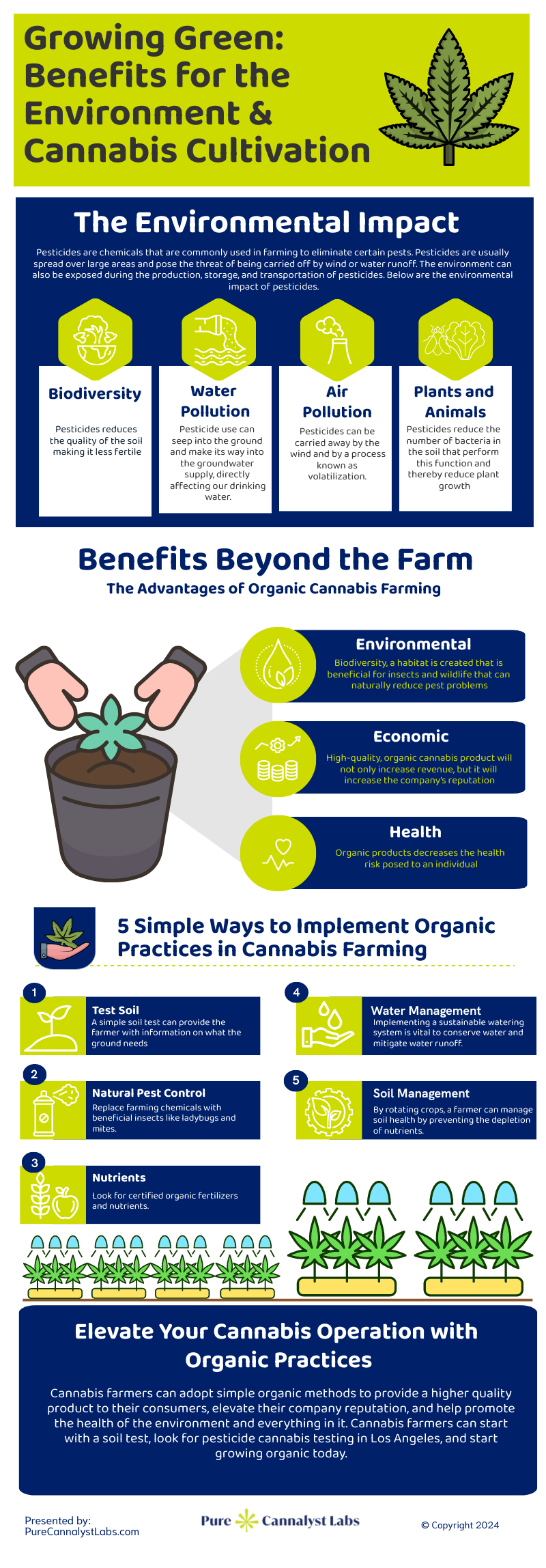Have you noticed the increased demand for organic products? How about the increasing call to action to help heal the environment? The movement towards sustainable farming practices and healthier living is on the rise. It’s time to step into a world where cannabis cultivation and environmental health go hand in hand. In this article, you will find the dirty details about the impacts that pesticides have on the environment, what the benefits are of going green and using organic farming practices, and also learn what to do to implement organic practices into your cannabis operation. Let’s get started on improving our environment and providing quality products to cannabis customers.
Table of Contents
ToggleThe Environmental Impact
Pesticides are chemicals that are commonly used in farming to eliminate certain pests. Common pests that are treated with pesticides include insects, rodents, other animals, fungi, and weeds. Pesticides are usually spread over large areas and pose the threat of being carried off by wind or water runoff. The environment can also be exposed during the production, storage, and transportation of pesticides. Below we will explore the impact that pesticides have on biodiversity, water supply, the air and atmosphere, and the living things of this earth.
Biodiversity: The importance of biodiversity cannot be overstated. Important to the well-being of humans, the health of all ecosystems, and the overall regulation of the climate, biodiversity plays a crucial role in the planet’s health. Pesticides affect organisms that are critical for the health of the soil. This reduces the quality of the soil making it less fertile. Also affecting the accumulation of organic material, the soil is unable to retain water in an efficient way causing water runoff (a problem of its own). Water loss, a lack of organic material, and a lack of fertility produce smaller crops and demand an increase in fertilizer.
Water Pollution: The resource of water is vital to sustain all life on this planet. There are many ways in which pesticide use pollutes our precious water supplies. Repeated years of pesticide use can seep into the ground and make its way into the groundwater supply, directly affecting our drinking water. Lack of organic material causes water runoff, making its way into our rivers and streams. Polluting our water systems, pesticides have negative impacts on the entire ecosystem. This includes animals and plants.
Air Pollution: Easily spread in the air, pesticides pollute our air and spread far and wide affecting everything in the ecosystem. Pesticides can be carried away by the wind and by a process known as volatilization. This happens when the pesticide reaches its intended target but later vaporizes into the air. Pesticides are then introduced into human and animal respiratory systems. These volatile chemical compounds also react with other chemicals present in the atmosphere creating greenhouse gasses.
Plants and Animals: The negative effects pesticides have on plants and animals are great. From the tiniest of organisms to the largest, entire ecosystems and everything in them can be affected. Nitrogen fixation is the process of converting atmospheric nitrogen into a form that plants can use. Pesticides reduce the number of bacteria in the soil that perform this function and thereby reduce plant growth (increasing the need for more increased fertilizer usage). Pesticides have been linked to dwindling bee populations that are vital for pollination. All animals are at risk of ingesting pesticides causing potentially deadly health conditions. Pesticides are carried through the food chain impacting plants, birds, fish, reptiles, amphibians, and mammals (including humans).
Benefits Beyond the Farm: The Advantages of Organic Cannabis Farming
When it comes to producing a product for the consumer market, quality is key to success. There is an increasing awareness of the dangers of chemicals in our food industry and also the damage that farming can have on our environment if not done well. The benefits of implementing organic farming practices include environmental benefits, economic benefits to the farmer and the business, and health benefits for the consumer.
Environmental Benefits: By growing organic and eliminating pesticides, biodiversity is left to thrive, water and air pollution is decreased, and plants and animals can live in a healthy ecosystem and have less potential for ingesting unwanted chemicals. By promoting biodiversity, a habitat is created that is beneficial for insects and wildlife that can naturally reduce pest problems. Eliminating the use of pesticides also lowers the amount of greenhouse gasses produced making organic practices better for the atmosphere.
Economic Benefits: With environmental health on the minds of more consumers, the demand for organic products has increased exponentially. Producing a high-quality, organic cannabis product will not only increase revenue, but it will increase the company’s reputation. Growing organic will enhance the aroma, flavor, and potency of the product. In the long run, farmers can expect to see higher yields and better quality cannabis by using organic practices and lowering the costs by eliminating the need for expensive chemicals and the cost of application.
Health Benefits: Health concerns are one of the many reasons consumers and farmers are choosing organic products. Repeated exposure to pesticide chemicals increases the health risk posed to an individual. Potential risks associated with pesticide exposure can be by inhalation, contact with skin, or by ingestion. These chemicals can be carried through the food chain by eating a plant or animal that has been exposed. This exposure can lead to unintended health consequences and can even be fatal.
5 Simple Ways to Implement Organic Practices in Cannabis Farming
Going green and cultivating organic plants can be intimidating at first. There are many strict rules and regulations required to be a certified organic grower. Don’t be intimidated by the process because that is what it is, a process. Let’s look at several ways a cannabis farmer can begin to produce a higher-quality product for their customers.
Test Soil: A simple soil test can provide the farmer with information on what the ground needs. Repair the soil using organic compost, manure, and other natural fertilizers to increase fertility.
Natural Pest Control: Replace farming chemicals with beneficial insects like ladybugs and mites. Some oils and soaps can also be used to deter pests from the fields.
Nutrients: Look for certified organic fertilizers and nutrients. Avoid using anything that is not certified organic.
Water Management: Implementing a sustainable watering system is vital to conserve water and mitigate water runoff. Drip irrigation would be an excellent way to achieve this.
Soil Management: By rotating crops, a farmer can manage soil health by preventing the depletion of nutrients. By using cover crops, weeds are suppressed and soil structure is improved.
Elevate Your Cannabis Operation with Organic Practices
Protecting our planet and the people in it should be a priority for all. Promoting abundant biodiversity, decreasing air and water pollution, and protecting plants and wildlife are all achievable with organic farming practices. Cannabis farmers can adopt simple organic methods to provide a higher quality product to their consumers, elevate their company reputation, and help promote the health of the environment and everything in it. Cannabis farmers can start with a soil test, look for pesticide cannabis testing in Los Angeles, and start growing organic today. Find an experienced lab that will work in partnership with your operation with top-of-the-line testing and equipment. Preserving the soil and providing nutrients that benefit the earth, while cultivating a product that is more beneficial to the consumer, can elevate your operation to new heights.
Infographic

